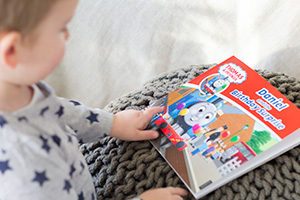How personalised books contribute to a child’s development
A personalised book gives a child the novelty of appearing in their very own story. But the actual act of reading a personalised book with an adult, and moving through a story world where the child encounters familiar names and experiences helps enormously with their language development, as evidenced in a study by Natalia Kucirkova, a Senior Lecturer in Early Years and Childhood Studies at Manchester Metropolitan University.
Children volunteered more spontaneous speech when reading a personalised book
Kucirkova’s study found that the advantages of the personalised book were two–fold. One discovery was that children volunteered more spontaneous speech when reading a personalised book. Suddenly finding themselves at the heart of the narrative invites both questions and recognition from children. They are encouraged to speak up with phrases such as ‘that’s me’ and ‘is it my birthday?’ This presents a greater opportunity for whomever is reading to the child to extend their speech with questions and prompts such as ‘Do you remember your birthday?’ creating a much more interactive reading experience.
Not only do they volunteer more speech but they speak for longer
The Book Trust identifies encouraging your child to talk about the book as a key factor in the shared reading experience. You can find a whole range of helpful tips to enhance the experience of reading to your child here: www.booktrust.org.uk/books/children/how-to-share-books/. BookTrust recommends talking about the characters and their dilemmas, giving children ample time to respond, and asking how a character might be feeling. Kucirkova’s study suggests that during the reading of personalised books, children take on a less passive role in the interaction. Not only do they volunteer more speech but they speak for longer, thus aiding their language development.
Personalised books also become a favourite on the bookshelf with children requesting regular reads
Another advantage that Kurcirkova’s study found that children generally retained more unfamiliar words from personalised books. Eighteen pre-school children were introduced to unfamiliar words in the context of both a personalised and non-personalised book. Over a period of time, the children had a far better success rate of recalling the unfamiliar words from the personalised book, than those they encountered in the non-personalised book. This suggests the significance of association in children getting to grips with new words. A book referencing their own experiences relating to school or family, or a holiday such as Christmas or Easter offers a safer ground for encountering new language. Personalised books also become a favourite on the bookshelf with children requesting regular reads. This repetition helps enormously with word recognition and retention.
While it’s incredibly exciting for a child to find themselves starring in their own book, a personalised book is a safe and stimulating place to grow a child’s speech, vocabulary, and reading recall with familiar themes and characters. The use of print books as opposed to reading from digital platforms has also been shown to be advantageous in a shared reading context. A 2016 study by Egmont in conjunction with Family Kids and Youth and with The University of Sussex’s Children and Technology Lab found that that reading from larger format books with plenty of illustrations allow for better sharing, with the adult reader becomes more integral to the reading process. Ethnographers also found other positive responses such as increased closeness, warmth, and higher levels of eye contact between parent and child. The combination of personalisation and print creates both a safe and stimulating environment in which to develop a child’s language and love of reading.

